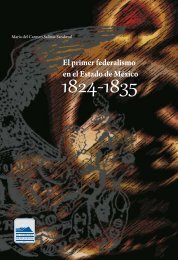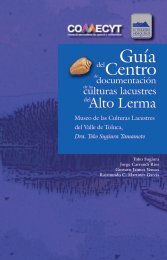You also want an ePaper? Increase the reach of your titles
YUMPU automatically turns print PDFs into web optimized ePapers that Google loves.
JOCELYN OLCOTT, SURFING THE NEW WAVE: INTERNATIONAL WOMEN’S YEAR<br />
AND THE GEOPOLITICS OF 1970S MEXICAN FEMINISM<br />
as a vehicle for cultural imperialism that<br />
sought to impose Western mo<strong>del</strong>s of family<br />
formation and sex roles, acting as a Trojan<br />
horse that smuggled in unacceptable sexual<br />
freedoms. The Mexico City daily Excélsior<br />
cautioned in its lead editorial about the conference<br />
inauguration:<br />
The Conference of International Women’s<br />
Year that begins today, in which women’s<br />
liberation will be debated, is important. Nevertheless,<br />
this should be understood as the<br />
full development of women and not in the<br />
distorted form of loveless sexual debauchery,<br />
as reproachable in men as in women, since it<br />
promotes the moral degeneration of everyone<br />
(Anonymous, 1975e: 6-A).<br />
Bebbington had not been the first lesbian<br />
to speak out at the NGO tribune. Frances<br />
Doughty, a leader of the National Gay Task<br />
Force in the United States, had spoken up<br />
during one of the very first sessions, expressing<br />
her desire to share ideas with other<br />
lesbians (Meléndez, 1975; Berdejo, 1975: 10;<br />
Anonymous, 1975f : 12; Bunch and Doughty,<br />
1975: 6). Over the weekend between Doughty’s<br />
intervention and Bebbington’s, they<br />
had gotten organized, dubbing themselves<br />
the International Lesbian-Feminist Caucus<br />
(Doughty, 1978: 145). On Monday, Doughty<br />
stood up with Bebbington as she set off a<br />
firestorm during a session on socialization<br />
and cultural attitudes and rejected compulsory<br />
marriage and motherhood and describing<br />
heterosexuality as a “form of cultural<br />
imperialism”. Bebbington’s insistence on<br />
women’s liberation from men and from obligatory<br />
maternity seemed to alarm the media<br />
even more than her open sexuality (see<br />
coverage of Bebbington’s speech [all on 24<br />
June 1975] in El Universal, Excélsior, Novedades,<br />
Diario de México, El Nacional; Fuentes,<br />
2014). Upon finishing her speech, Bebbington<br />
was surrounded by women sporting<br />
“radicalesbians” t-shirts, who showered her<br />
with hugs and kisses. Some audience members<br />
cheered; others booed; a few simply<br />
walked out.<br />
It was this <strong>las</strong>t group that got the attention<br />
of the prominent theater director<br />
Nancy Cárdenas. Like many other feminist<br />
activists of the early 1970s, Cárdenas was<br />
a veteran of the ’68 protests and had lived<br />
and studied abroad, at Yale University in the<br />
United States and then in Lodz, Poland. She<br />
was also without question Mexico’s most<br />
prominent lesbian. A founder of the Mexico’s<br />
first openly gay organization, the Frente<br />
de Liberación Homosexual, Cárdenas<br />
had publicly proclaimed herself a lesbian<br />
the year before on the nationally televised<br />
talk show, Jacobo Zabludovsky’s 24 Horas.<br />
After the Monday panel where Bebbington<br />
first spoke out, some “visiting lesbians” urged<br />
Cárdenas to participate in the following<br />
day’s forum on lesbianism:<br />
They told me that the Communists, my own<br />
compañeras from earlier in the party, abandoned<br />
the conference hall when an Australian<br />
girl said “I’m a lesbian feminist”, she recalled<br />
later in an interview. They said, “Throw out<br />
the sickos, we’re out of here”. That seemed<br />
to me to give an incomplete image of Mexico,<br />
because I was also a leftist militant, was a lesbian,<br />
and I had another position and raised my<br />
finger (Mogrovejo, 2000: 67).<br />
Inspired by what she deemed the “guerrilla<br />
mo<strong>del</strong> of the US women’s liberation<br />
movement”, Cárdenas had acceded to the<br />
visitors’ request for her support. An estimated<br />
250 women looked on as Cárdenas<br />
presented the Declaración de <strong>las</strong> lesbianas<br />
mexicanas, pointing to sexual recognition<br />
as a critical form of social liberation. “We<br />
trust […] that the tactics of struggle used by<br />
our brothers and sisters in other parts of the<br />
world will help us to find our own path”. 12<br />
12 Laurie Bebbington sent a copy of the declaration<br />
to Elizabeth Reid saying it had been anonymously <strong>del</strong>ivered<br />
to Frances Doughty, who distributed it to the<br />
press and the tribune (Elizabeth Reid papers, Australian<br />
National University, folder 87). Claudia Hinojosa<br />
attributes the unsigned Declaración de <strong>las</strong> lesbianas<br />
de México to Cárdenas, insisting that one can recognize<br />
the “unmistakable prose of a luminous spokeswoman<br />
of Mexican lesbians, the beloved and eternal<br />
Nancy Cárdenas” (Hinojosa, 2001: 179).<br />
<strong>21</strong>0



![bicentenario_1[V2]](https://img.yumpu.com/68677971/1/167x260/bicentenario-1v2.jpg?quality=85)
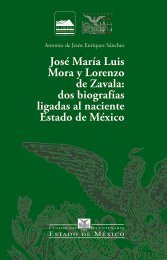
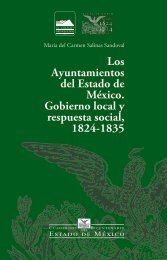
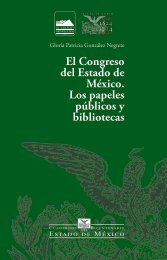
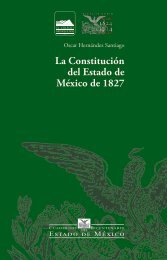
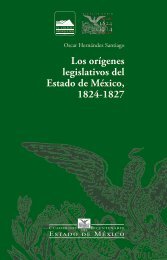
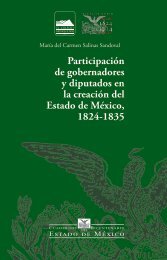
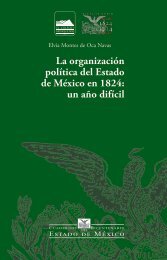
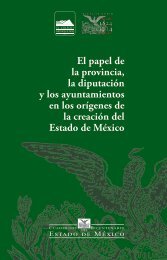

![El_primer_federalismoEM[final]_compressed (2)](https://img.yumpu.com/68483279/1/178x260/el-primer-federalismoemfinal-compressed-2.jpg?quality=85)
